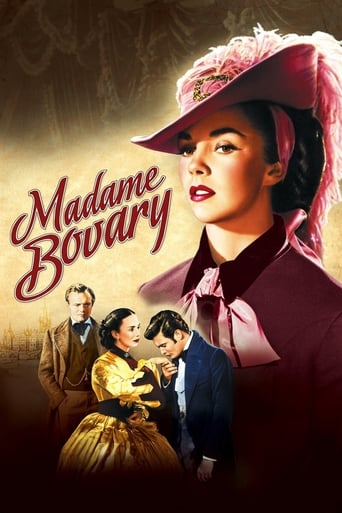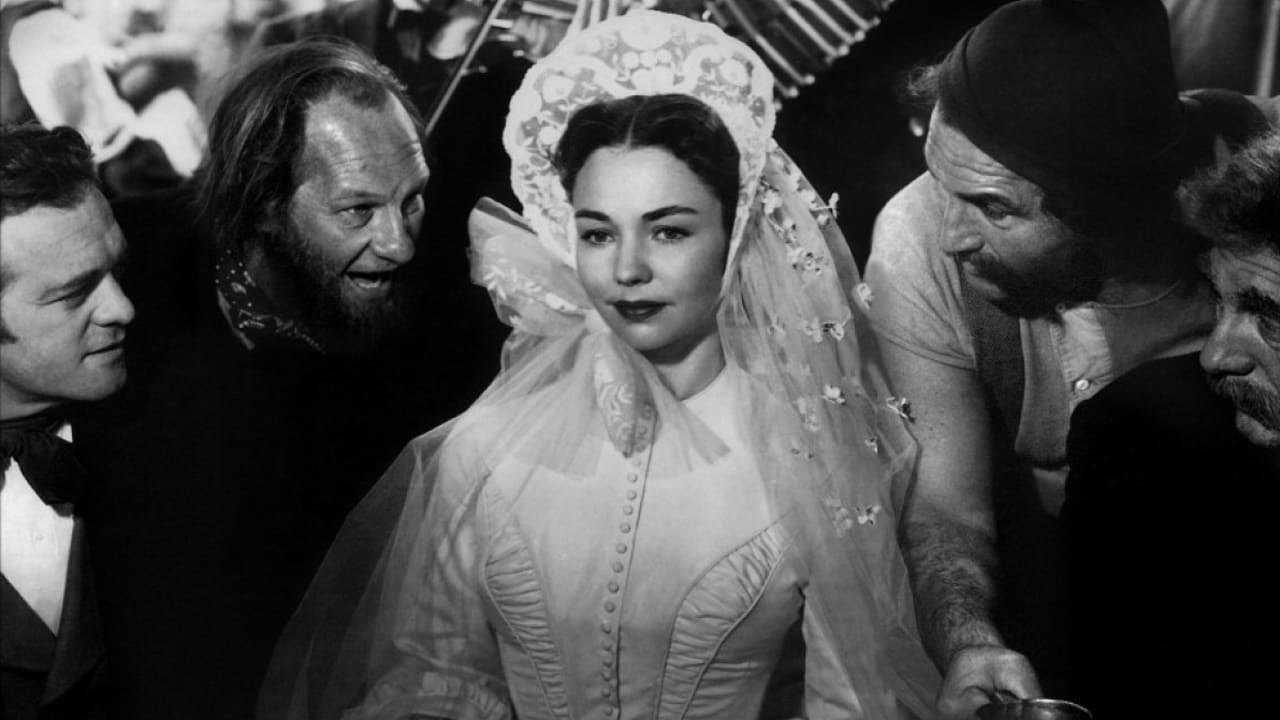smatysia
I remember reading this book a couple of decades ago. I remember being bored by it, in spite of it supposedly being salacious. Maybe it was a bad translation, or maybe it was Flaubert. This film wasn't exactly boring, but I wasn't rapt with attention as I viewed it, either. Van Heflin, (my mother's favorite actor) was pretty decent as the clueless country doctor, and James Mason can't be bad. I watched this in the first place because of Jennifer Jones, when I realized that I had never seen any of her work. She was beautiful, and clearly a good actress, but I'm not sure the material suited her. There is a lot of talk of bowdlerizing this movie to get it past the Hayes office, and that's probably true. I wonder how the French would have made this film in the Forties? I cannot really recommend it.
moonspinner55
In 1857 Paris, author Gustave Flaubert is on trial for immorality after publishing his scandalous book "Madame Bovary"; his defense is to tell the court and the spectators the story of a French farm lass who married a village doctor of limited talents and personality. With designs on infiltrating high society--despite the fact her husband is viewed as an obscure medic to the working classes--the woman takes lovers and spends money lavishly, selfishly grasping at popularity and acceptance. According to the film, Flaubert's writings were not considered challenging to 19th century France--only shocking and vulgar. But director Vincente Minnelli doesn't wish to get his hands dirty, and his visualization of the tale is just high-flown soap for female audiences. As Emma Bovary, Jennifer Jones runs the gamut on suffering; indeed, some of her hysterics show a talented actress at work, but her elaborate wardrobe upstages her. Jones marries Van Heflin, who warns her that he isn't a very exciting person, and soon thereafter is staring out the window, tossing off jaded, quasi-literary thoughts such as "Do you know why the clock strikes? To announce the death of another hour!" The picture would be a howler if it didn't take itself so contemptuously serious. The results are coated with a glum, gummy gloss, while James Mason (as Flaubert the Narrator) poses on the witness stand as if his portrait were being painted. ** from ****
Neil Doyle
I have to give MADAME BOVARY a mixed review.It's interesting to note that a film based on a French classic had only one Oscar nomination in a technical category--none for the direction or performances. That's probably because despite all the painstaking care that went into this version of MADAME BOVARY, it seems to make a surface connection with the viewer.JENNIFER JONES has the role of a woman even more selfish than Scarlett O'Hara--dazzled by her own romantic illusions to the point where she has lost all connection with reality. She has a faithful husband (VAN HEFLIN) whom she treats with contempt or totally ignores in favor of more interesting prospects--and almost finds one in LOUIS JOURDAN, once again playing a Frenchman who abandons his sweetheart when he realizes she will make too many demands on him.Vincente Minnelli has directed the whole affair with a rather sluggish pace, relieved occasionally by well-staged scenes such as the ballroom moment where the music of Miklos Rozsa reaches a crescendo of emotion amid whirling camera movements. It's a great moment but unfortunately most of the film's remaining scenes seem to pale by comparison with that stunning triumph of music and photography.JENNIFER JONES is unable to make her Madame Bovary appear anything more than vain and foolish and, as usual, there's something alienating about her personality--which should have suited the role but keeps her from becoming the victim she's supposed to be.The JAMES MASON courtroom prologue with the actor as Flaubert seems to be operating from a different film and doesn't blend well into the actual story. Perhaps a different approach would have worked better.Still, this is a better than average melodrama of a woman scorned who turns out to be her own worst enemy. While all the performances around her are more than adequate, none of them really stand out the way they should in an adaptation of a classic story.Fans of Jones, Jourdan or Heflin will no doubt find the film fascinating despite its flaws and the Miklos Rozsa score is worth hearing for the ballroom sequence alone.
MisterWhiplash
Vincente Minelli's Madame Bovary does whatever a studio film can do, of the period, to make a book like Flaubert's into a more than competent production. And it does work out for Minelli as one of his better films that his Madame Bovary is a tale that tries to get us to understand, though likely not to sympathize, with its (anti) heroine who cheats on her loving husband and sells out his home from under his nose, only to do himself in in the end. It's pretty bleak stuff, but there's an air of exhilaration to it, like a fresh Lifetime TV movie that hasn't yet been over-dampened with the conventions that plague it, and has a grace and daring to it as well. It might strike some as a little much that Minelli book-ends the picture with the trial of Flaubert as it should have nothing to do with the story itself. But, there is that attempt, that try at getting the readers of its time to get a grasp on disillusionment in marriage, which is something that is instantly recognizable, and to make compelling literature and to never have it silenced. It's even adiramble in post WW2 America to make a point via a French novel how marriages can go wrong. That's not all there is, of course, as countless English classes have taught us with the book.It goes without saying the book is far richer and with more emotional depth in the descriptions that go into Flaubert's writing. But it should be said that Jennifer Jones is also the best Bovary that has yet been brought to the screen, a woman who is very, very hard to like at all for what she does, particularly to an everyman. Albeit, arguably, a very plain and average guy like her husband doctor who doesn't want anything more than to do his duty and go through the daily grind. Jones makes her in a small way sympathetic, something to her presence has her poised as a tragic figure, hard to pinpoint but not easy to grasp either. You want to hate her as the film rolls along through its second half, as she becomes more desperate and more and more indebted to a world of men who have come to hate her too. But her desperation, in a way, makes her all the more human, less entranced by the ultimately foolish ideals of her storybook romances and grounded to a halt with reality.Flaubert doesn't give us the easy route of making it a statement of blame- which might set it apart from what would be a "Lifetime" movie of the present. Jones is terrific in the part, wavering between being a bad mother (the baby always cries in her presence), a neflectful wife (when is she home?), and a sour of a mistress (keeps that Italian waiting for years, what the hell?) And it's pulled off quite nicely from her. Credit where it's due to to Minelli, who constructs that ballroom sequence that spins and spins like the perpetual loop from that superimposed shot from Shadow of a Doubt; it's one of his true virtuoso sequences, a high-wire act done all for the sake of enlivening and critically molding the mood of Emma Bovary, a woman who can be taken away by the exuberance of escapism, ignorant of what she's really getting into in the midst of a plastic sort of world. There's a lot to be read into the source itself (just see the arguments thrown around in the book club scene in Little Children). The movie, however, is an exquisite time capsule where it's given an intro like with a new book edition, but with its own space and freedom to succeed on its own terms.


 AD
AD



